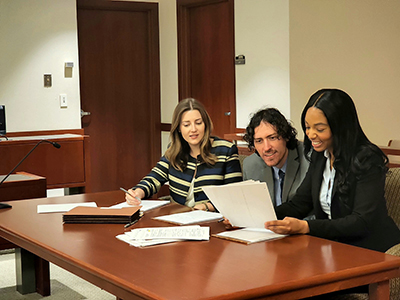Students in the Advanced Criminal Practice Clinic had a crash course in trial preparation this semester. Opting to continue their clinical work for a second semester, Nerenda Atako ’22, Christina McLaughlin ’22, and Bryan Teresi ’22 prepared to go to trial defending a client indicted on serious felony charges. In addition to filing and arguing more than a dozen pretrial motions, the students examined multiple witnesses on the stand through both direct- and cross-examination during the motion hearings.
 According to the students, the real-world aspects of trial preparation offered opportunities to develop these skills beyond those typically provided in simulation courses. Teresi stated he learned the importance of “investigation, communication with the client,” and dealing with bad facts. Atako explained that she had a better understanding of the importance of case theory: “It was crucial that we considered both the strengths and weaknesses of our case to adequately prepare for different stages of the process and best position ourselves to advocate for our client.” McLaughlin said that it was the dynamic nature of the trial preparation process that differentiated it from her simulation work. She noted, “Unlike mock trial, where you know all the evidence and witnesses in advance, we were constantly updating our strategies to adapt to changing circumstances and new information. It showed me how trial lawyers have to be very flexible and prepared for unpredictable situations.”
According to the students, the real-world aspects of trial preparation offered opportunities to develop these skills beyond those typically provided in simulation courses. Teresi stated he learned the importance of “investigation, communication with the client,” and dealing with bad facts. Atako explained that she had a better understanding of the importance of case theory: “It was crucial that we considered both the strengths and weaknesses of our case to adequately prepare for different stages of the process and best position ourselves to advocate for our client.” McLaughlin said that it was the dynamic nature of the trial preparation process that differentiated it from her simulation work. She noted, “Unlike mock trial, where you know all the evidence and witnesses in advance, we were constantly updating our strategies to adapt to changing circumstances and new information. It showed me how trial lawyers have to be very flexible and prepared for unpredictable situations.”
Although the case ultimately settled prior to trial, the work the students put in was vital to achieving a positive outcome for the client. Teresi observed that the effort he and his colleagues invested into trial preparation played a pivotal role in the clinic’s relationship with the client: “That effort and willingness builds trust and ensures the client that other options such as negotiating a deal are not being considered because they involve less work or less anxiety, but because they are worth considering for the client’s interests.”